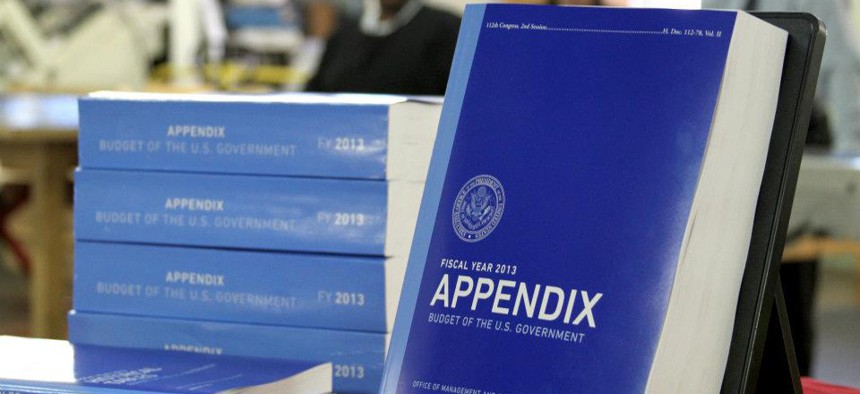
Government Printing Office photo
Budget day arrives with low expectations
If history is a guide, the judgment that President Obama's budget is dead on arrival is probably accurate.
The conventional wisdom that already surrounds President Obama’s fiscal 2013 budget is bleak, indeed. Dead on arrival. Just another political document. A collection of small-bore ideas.
Harsh, yes. But, if history is any guide, the judgments are pretty accurate, more likely than not. The agenda that the president chooses to pitch on Monday probably won’t go anywhere on Capitol Hill. Second-term presidents aren’t miracle workers. Those who have proposed big ideas in their reelection years have seen failure as often as success.
Just ask President George W. Bush. Social Security was his white whale. During his State of the Union address in 2004, he outlined his wish to transform Social Security by offering young people the chance to set up private retirement accounts.
Bush made it his top domestic priority through the first half of 2005, traveling the country to pump up support. But his attempt to overhaul the massive government retirement program in the same year that the nation became mired more deeply in Iraq and Hurricane Katrina wrecked the Gulf Coast never caught on. By June of that year, Gallup’s pollsters found that 65 percent of the public disapproved of the president’s stand on Social Security, a sentiment that eventually forced him to pull the plug.
Similarly, President Clinton spent his second term busy but not all that productive. The cautious budget that he introduced in 1996 called for level and steady funding—computers for classrooms, a child tax credit—compared with his grander ideas of previous years. He managed to enact a tax credit of $400 per child in 1997 after his reelection, along with a reduction (from 28 percent to 20 percent) in the capital-gains tax rate. But the rest of the term was marked by frequent clashes with then-House Speaker Newt Gingrich and impeachment proceedings triggered by his affair with White House intern Monica Lewinsky. A rocky term, indeed.
Yet, it had a bright spot. Obama would love to see the sustained economic growth and the balanced budgets of Clinton’s second term. The unemployment rate dipped to 4.7 percent in 1997, the lowest level since 1973, and the budget showed a surplus in 1998 for the first time since 1969.
President Reagan had more success with his agenda. He used his budget and State of the Union address in the 1984 election year to call for reducing federal spending and regulations and for overhauling the tax system. Once reelected, he managed to enact his landmark tax reform in 1986.
If Obama succeeds in winning a second term, he’ll inherit this mixed historical record. His ability to carry out his budget priorities will depend, for one thing, on the makeup of the next Congress—although even on this, the past is ambiguous. Reagan and Clinton each achieved some success despite facing a Congress that was partly or wholly in the other party’s control; Bush got nowhere with a Congress entirely in his own party’s hands.
If a reelected Obama shares Pennsylvania Avenue with a Congress in which Republicans control one or both chambers, divided government would limit his ability to move ahead with consequential legislation ranging from tax credits for manufacturers to tax hikes on the rich or tweaks to corporate taxes for multi-national companies. In any event, the president wouldn’t find much room for new ideas. His proposals must fit within the spending caps laid out in the Budget Control Act passed last summer to end the showdown over raising the debt ceiling.
Count on one truth above all: Regardless of who sits in the Oval Office, this is an era of austerity and contraction. Given the country’s mounting debt and the political pressure to reduce it, budget wonks assume that a second-term Obama would get nowhere in resolving the nation’s financial predicament. They are already turning their attention to 2017, after the next presidential election, as the year they hope will bring substantial fiscal changes—meaning entitlement reform or deficit reduction (or both). Neither topic is in vogue this year on the campaign trail.
“I don’t think either party is preparing people for what lies ahead,” said Paul Posner, director of George Mason University’s public-administration program, who managed the Government Accountability Office’s budget and public finance work. “Democrats are not exactly preparing the way for the pain of entitlement reform. Neither are the Republicans with their antitax rhetoric.”
Instead, longtime budget experts predict that Obama’s blueprint will feature a flurry of familiar ideas from previous speeches. “The second-term administration will be about consolidation and implementation—following through on the substantial things,” Posner said. “Financial and health care reform were just huge undertakings.”
Here’s another constraint: A reelected Obama, barring a crisis, would have a short window of opportunity to make any major policy changes before the 2014 congressional campaigns begin in earnest. During that period, he and Congress must tackle some hard issues, including expiring tax cuts—notably, those passed during the Bush presidency—and the automatic spending cuts that the Budget Control Act decreed for the end of 2012.
Obama would surely start his next four years with huge battles on Capitol Hill and trillions of dollars at stake. Kicking off a second term with his boxing gloves on—even before his inauguration—wouldn’t leave the president much chance of pursuing any wish list he may unveil next week in his budget. Hope and change? Don’t expect much.






